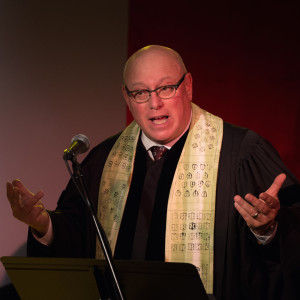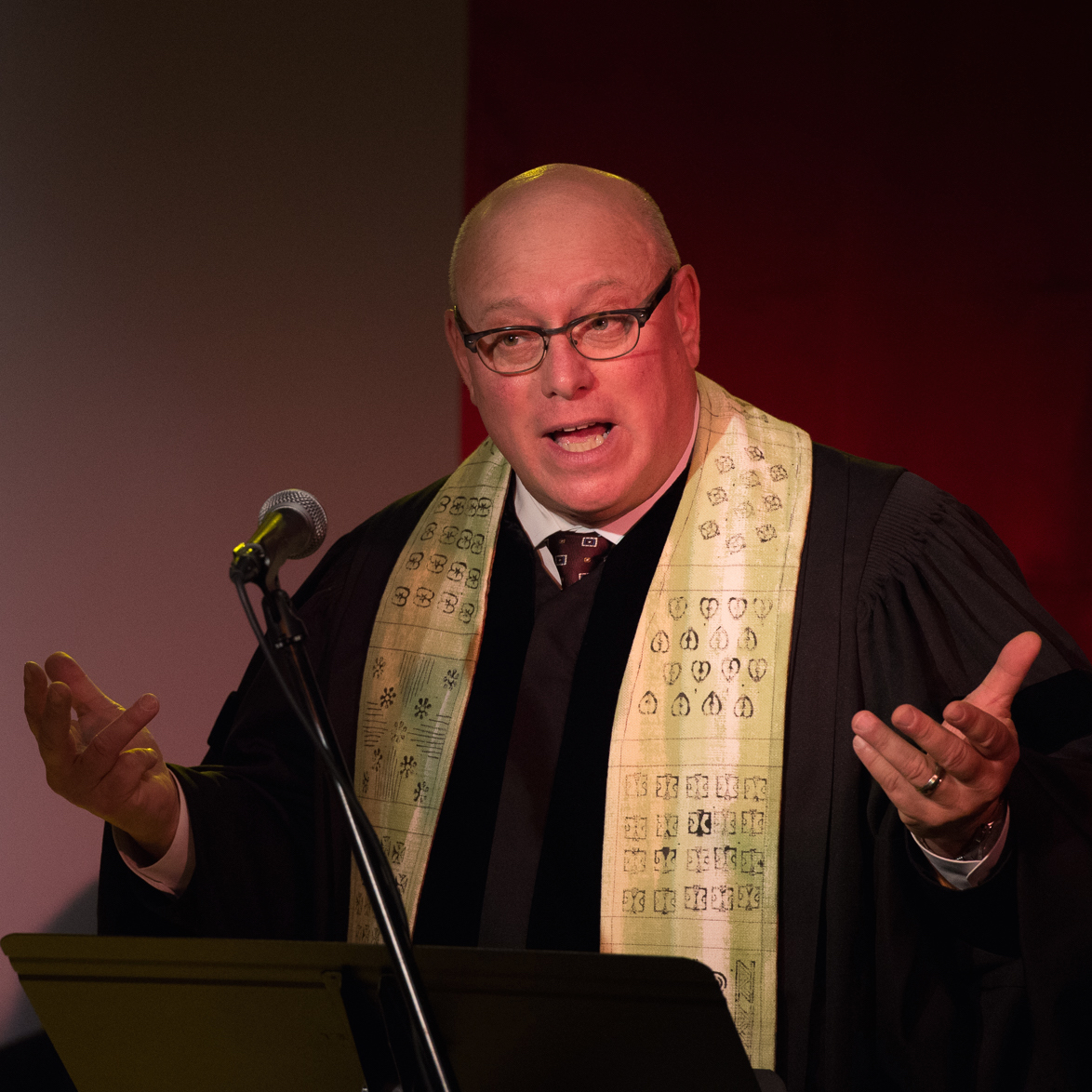We Need to Hear Other Voices – by Harold M. Delhagen
 It wasn’t the sort of compliment I might have hoped for, but it was the one I most needed. It came from a parent of one of our teen-aged son’s friends. Within our small town she was known as a highly enlightened, radically progressive thinker and feminist. She had decided to begin attending the church I was serving at the time. We were a growing congregation with a vibrant youth program and an unabashed liberal theological message. She had chosen to be a part of our church family for both reasons. It was flattering to hear her accolades about the things we were doing and, especially, to hear her highlight the content of my sermons. So far I was simply elated at the coup of gaining this prominent representative of progressive enlightenment. Then she went on to explain how she would only be with us about half of her time. The other half she would be attending another congregation who had a woman as their pastor. She explained, Harold, you are a fine preacher, this is a fine community of believers, but I need to hear other voices – to only hear your voice and your thoughts week after week will just not be enough.
It wasn’t the sort of compliment I might have hoped for, but it was the one I most needed. It came from a parent of one of our teen-aged son’s friends. Within our small town she was known as a highly enlightened, radically progressive thinker and feminist. She had decided to begin attending the church I was serving at the time. We were a growing congregation with a vibrant youth program and an unabashed liberal theological message. She had chosen to be a part of our church family for both reasons. It was flattering to hear her accolades about the things we were doing and, especially, to hear her highlight the content of my sermons. So far I was simply elated at the coup of gaining this prominent representative of progressive enlightenment. Then she went on to explain how she would only be with us about half of her time. The other half she would be attending another congregation who had a woman as their pastor. She explained, Harold, you are a fine preacher, this is a fine community of believers, but I need to hear other voices – to only hear your voice and your thoughts week after week will just not be enough.
I immediately understood. I thought back to the previous congregation I had served. It was a great experiment in blending a traditional Euro – American congregation with a newly formed Korean church. I recalled how beautiful it had been when we would gather both groups for worship, and to hear the holy cacophony of passionate hymn signing in both languages, and how awesome it was to realize that in spite of different languages being sung at the same time there was a clarity in it, both because of the selection of mutually old favorite hymns, but more importantly, because the Holy Spirit was weaving our hearts and voices together. We could sense that something beyond ourselves was happening. As one of our old favorites testified, there was a sweet, sweet spirit in (that) place.
When I was invited to come along side the Synod of the Northeast in their time of transition, I brought this lesson along with me. This is one of the most diverse synods in the Presbyterian Church (USA). Within our bounds there are over a hundred different languages spoken and probably twice as many various racial and ethnic groups. Even in our most rural areas I discovered a rich diversity. And so I carry my friend’s challenge – it becomes my challenge: we need to hear other voices.
In early reflection upon our governance structures and the people around the table it was painfully clear that they almost all looked like me! In fact the average age may have even been older! All the while I am hearing those at the table bemoaning the fact that we lack racial and ethnic diversity, they would constantly cry out where have all the children gone?
It was at this convergence of our reality and aspirations that a New Way Forward was created. This New Way is one that aspires to intentionally welcome new voices into full participation and leadership within the beloved community of Presbyterians in the Northeast.
It became clear that while those in governance meant well and aspired to be welcoming – we had failed. Our work quickly moved to deep reflection on what we have come to call unintended barriers to full welcome. As we moved into this season of reflection we began to confess that at some levels these barriers may have even been intentional. The result was a new missional statement that would be intentionally public in order that we would place our selves accountable for living into our deeper aspirations. This statement reads:
We are a regional community of presbyteries and congregations learning to respond to God’s call to become agents of divine justice, transforming the Presbyterian Church (U.S.A.) in the Northeast into a community of hospitality and welcome for all. We recognize that we have not always lived into the gift of our great diversity. We have not always fully welcomed all those within the communities we serve, including people of different racial or ethnic identities, economic classes, genders, abilities, sexualities, immigration statuses, or those who are marginalized in other ways.
Finding deep joy in our differences, we commit to equipping the saints for a courageous and steadfast witness of love and hope; learning, growing, worshiping and working together.
This confessional statement is our public wittiness to become something different – to become the Beloved Community – and to model this new way to our presbyteries, congregations and their communities.
But confession without action is simply lip service. We have come to recognize that we must drill deeper. A profound next step has been to open an honest and uncomfortable conversation on racism and white privilege and to identify the intended and unintended barriers our white (mostly upper middle class) majority has kept in place as we have gone about seeking to be faithful witnesses to Jesus Christ.
The season of the Passiontide, and particularly Good Friday, are a powerful reminder to me that the way of Christ is one of laying down one’s power. This ongoing Good Friday experience within our Synod Community is the only way to a resurrected witness. We have been clear that deep reflection upon white privilege is only a next step in a long journey. It is our hope that this uncomfortable and even painful journey will teach us how to further explore other areas of privilege. We know that others exist such as clergy privilege in which the church seems to defer to those in certain offices. There are privileges given to wealth and even to those who share the same political ideologies. The list of places where barriers exist is almost overwhelming. The intention is to build our capacity to learn new ways of living and working together that is based upon humility and servanthood rather than power and privilege.
Led by this Sprit, the 2014 Synod Assembly adopted new by-laws and standing rules that press against the core of our existing Presbyterian structures by removing the requirement that commissioners serving our governance structure need be office bearers. In other words, you can be a full member of our Synod Assembly or our Mission and Ministries Commission even if you are not a Ruling (that word may also reflect part of our problem) or Teaching Elder. We have come to recognize that our current governance structures are ineffective in reaching our racial ethnic, immigrant, new worshipping communities and our young people. The old rules are the barriers. They are a barrier to welcoming all the voices around us and therefore to our aspiration to live more deeply into the Kingdom of God and to become the Beloved Community.
It took only a couple of months for the structures to demand obedience to the letter of the law. A team comprised of those who penned our new by-laws and standing rules as well as those representing the new voices we wish to include at the table defended our choice before the General Assembly’s Permanent Judicial Commission. We knew it didn’t look good when we were asked if we might “stipulate to the facts” (ugh!) I learned long ago that is institutional speak for “let’s just keep the conversation based upon the rules”, all the while ignoring that the rules, without consideration of the dreams and aspirations in this case, only reinforces the barriers and leaves us wondering if those barriers are intended or unintended. Stipulating to the facts means the process refuses to be open to the inclusion of the voices from our witnesses and will inevitably result in silencing the voice of the Holy Spirit that is so clearly in our midst.
This is just a next step in the journey on our New Way Forward.
Harold M. Delhagen is the Synod Leader of the Synod of the Northeast. For the past three and a half years, he’s led a synod-wide process of transition and reflection to articulate the new ways in which the Synod can serve as a unencumbered space of fellowship, worship, and missional innovation for a community that gathers 22 presbyteries, 1,100 congregations, dozens of fellowships and new worshipping communities, and over 180,000 members.
Now a teaching elder member of the Presbytery of Geneva, Harold was ordained as a minister of Word and Sacraments in the Reformed Church in America. He served congregations in Philadelphia and Upstate New York, and participated in various ecumenical conversations, among them those around the Belhar Confession between the RCA and the Uniting Reformed Churches in Southern Africa.

